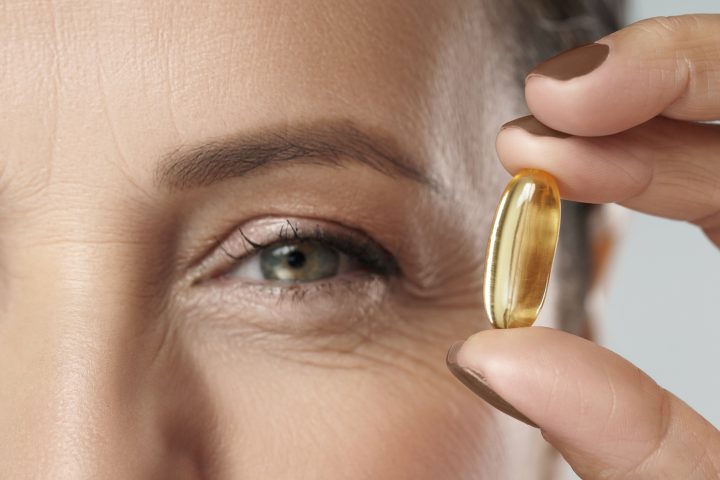Omega-3s Work Wonders for Weight Loss!

Have you wondered why populations that eat a lot of fish are at less risk for obesity?
It turns out that omega-3 fatty acids have a powerful influence over body weight.
That’s right! When you have plenty of omega-3s in your diet, it’s far easier to maintain a healthy weight, and those pesky sugar cravings can become a thing of the past.
This is because omega-3s stimulate the production of the sugar burning hormone adiponectin, which helps maintain healthy blood glucose levels – essential for weight maintenance. And omega-3s also reduce inflammation, one of the most common drivers of abnormal weight gain.
Researchers at the University of South Australia studied a group of 75 people who were diagnosed as being either overweight or obese and who also had cardiovascular disease risk factors such as high blood pressure and high cholesterol levels. The results of this survey showed that omega-3s assisted weight loss and improved cardiovascular health.
Scientists also believe that omega-3 fatty acids improve blood flow to muscles during exercise, and help stimulate enzymes that transport fat to where it can be stored and then used for energy.
But that’s not all!
Omega-3s are also known for benefits such as better brain and memory function, greater eye development and sustainment, suppression of unhealthy inflammatory responses, as well as an ability to reduce risks of coronary heart disease (CHD), stroke and Alzheimer’s disease.
The skin, being the largest organ in the human body is often the first visual indicator of an essential fatty acid deficiency. EPA and DHA, the omega-3 essential fatty acids in fish oil, along with GLA, the essential fatty acid found in borage and evening primrose oils, are crucial nutrients for skin health and function. Want better skin? Increase your intake of omega-3s!
What foods are high in omega-3s?
Foods that contain highest amounts of omega-3 fatty acids include oily fish like salmon, sardines and mackerel, as well as walnuts, hemp seeds, chia seeds and flaxseeds. Butter is also a good source of omega-3s, but only if it comes from cows that eat grass (not grain).
Meat, chicken, grains, fruit and vegetables are not on the list above because they contain omega-6s (and to a lesser extent omega-9s), not omega-3s. And if you think about what you eat each day you will realise you are consuming far more omega-6s than omega-3s.
Even if you include the right seeds, butter and nuts in your diet, it’s unlikely that you’ll be able to meet your daily omega-3s needs. How much chia and butter can you eat in a day?
Your body needs omegas 3,6 & 9 in the right proportions
A balanced ratio of omega-6/omega-3 fatty acids is important for good health and for the prevention of obesity, cardiovascular disease, CHD and other chronic illnesses – especially those with an inflammatory component.
Studies show an omega-6/omega-3 ratio of 3:1 to 4:1 could prevent many diseases, and a ratio of 1:1 to 2:1 could be even better as it appears to be more consistent with what our ancient ancestors ate.
To put this in perspective, most Westerners consume a ratio of up to 30:1 omega-6/omega-3. It’s no wonder we have such high incidences of inflammatory diseases like obesity, CHD, depression and arthritis!
In short, if you’re not including oily fish like salmon or sardines in your diet at least three times a week, we recommend supplementing daily with a high quality Omega-3 combo.
How much omega-3 do you need?
To maintain good health you will need 1,000 – 2,000mg per day. To improve an inflammatory condition you will need between 3,000 – 6,000mg of omega-3 per day. Whilst omega-3s are widely available as a supplement, not all omega-3 supplements are created equally. Omega-3s are fragile molecules that must be harvested and processed under strict conditions to prevent them from becoming rancid and to eliminate the risk of heavy metal contamination.
To combat sugar cravings, take 1,000mg Omega-3 with each meal and also between meals (5,000 – 6,000mg per day) until cravings cease. Continue to take 2-3 times per day to maintain healthy blood glucose control.
When it comes to purchasing omega-3 supplements, you definitely get what you pay for. Cheap oils are often rancid (toxic) and may also be contaminated. And low priced omega-3 capsules usually have low potency, meaning you may need to take up to 20 capsules a day to meet your maintenance needs.
If there is one supplement to consistently invest in to keep your body healthy, it should be a high quality omega-3 supplement. See it as an investment in your present and future health. With the right nutrients you can build a healthy, strong body that will look after you well into your future.

